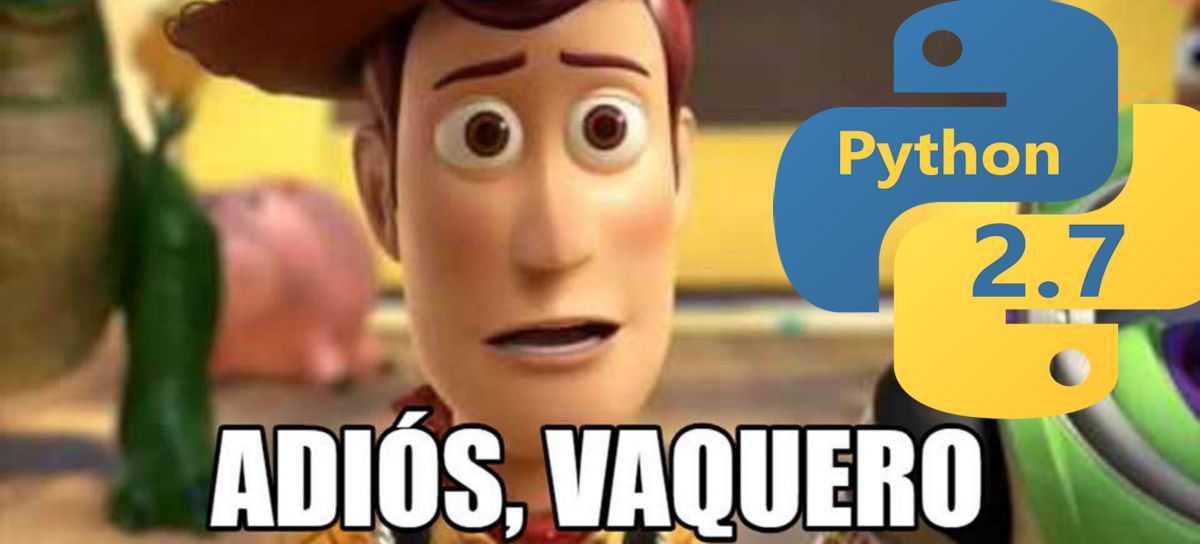
The Python Software Foundation unveiled Some days ago the release of Python version 2.7.18, being this is the latest version of the Python 2.x branch. And it is that since the launch of Python 3.0, the recommendation was made to abandon the previous Python versions in favor of this latest version.
In March 2019, Guido van Rossum, the creator and leader of the Python programming language project, announced that support for python version 2.7 would end on January 1, 2020. After this deadline, Python 2.7 will no longer benefit from any updates, not even for security fixes.
Obviously it's always possible for indie developers to fork Python 2.7 to guarantee its continuity. But for Guido van Rossum, we will no longer have to wait for him and his team to receive updates or even decisions related to Python 2.7 development.
Python 2.7 has been in active development since the release of Python 2.6, more than 11 years ago. Throughout those years, CPython developers and core contributors determinedly applied bug fixes to branch 2.7, not a small task since Python 2 and 3 branches diverged.
There were big changes midway through the life of Python 2.7, such as the feature in PEP 466, it supports the SSL module and hash randomization. Traditionally, these features would never have been added to a maintenance mode release, but exceptions were made to keep Python 2 users safe. Thanks to the CPython community for their dedication.
Recall that Python is a programming language interpreted designed by Dutch programmer Guido van Rossum in 1991.
The branch of Python 2.7 was formed in 2010 and its support was originally planned to be discontinued in 2015But due to insufficiently active migration of projects in Python 3 and problems encountered during code processing, Python 2's lifespan was extended to 2020.
Python 3 was developed in parallel and was released more than 11 years ago for the first time. The compatibility break with Python 2 was very controversial at the time, but Python 3 was meant to be the main variant of the language and Python 2 was no longer significantly changed after version 2.7, but instead remained. Officially, support for Python 2 is no longer available.
Although officially the CPython project will no longer deal with Python 2, community representatives who are interested in continuing supporting this branch in its products will continue working on fixing vulnerabilities in Python 2.7.
For example, Red Hat will continue to maintain packages with Python 2.7 for the entire lifecycle of RHEL 6 and 7 distributions, and for RHEL 8 it will generate package updates in Application Stream until June 2024.
Regarding this new release compared to 2.7.17, Python 2.7.18 contains only a handful of fixes, as you can see in the version control system.
This is the last activity that Python developers have officially undertaken in this version of Python. Since the release of Python 2.0 in 2000, Python 2.x has been the main branch of the language for many years with continuous improvements until Python 2.7, which appeared almost 10 years ago.
Python 2.7 was fortunate to have the services of two generations of binary builders and operating system experts, Martin von Löwis and Steve Dower for Windows, and Ronald Oussoren and Ned Deily for macOS. The reason we provide Python 2.7 binary versions for macOS 10.9, an operating system deprecated by Apple 4 years ago, or why the "Microsoft Visual C ++ Compiler for Python 2.7" exists is because of these people's dedication.
Remember that Python 2 also disappears from many of the Linux distributions. For example, Ubuntu 20.04 has dropped Python 2, as version 3.8.2 is supplied by default.
Finally, for those who are interested in knowing more about the release of this latest corrective version of Python 2.7, you can consult the release note in the following link.
Download
Regarding the download of this version, you can get the packages from the following link.